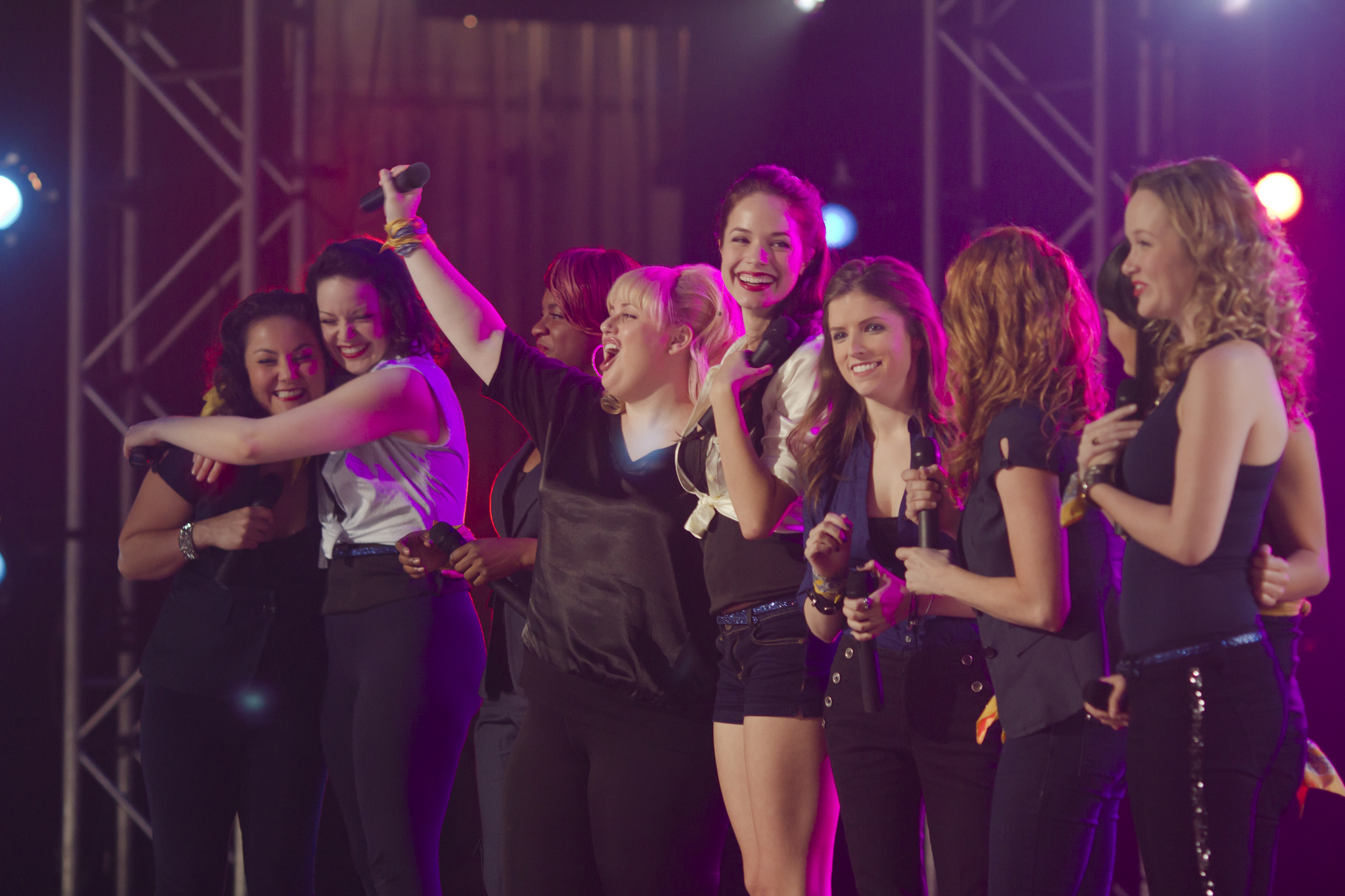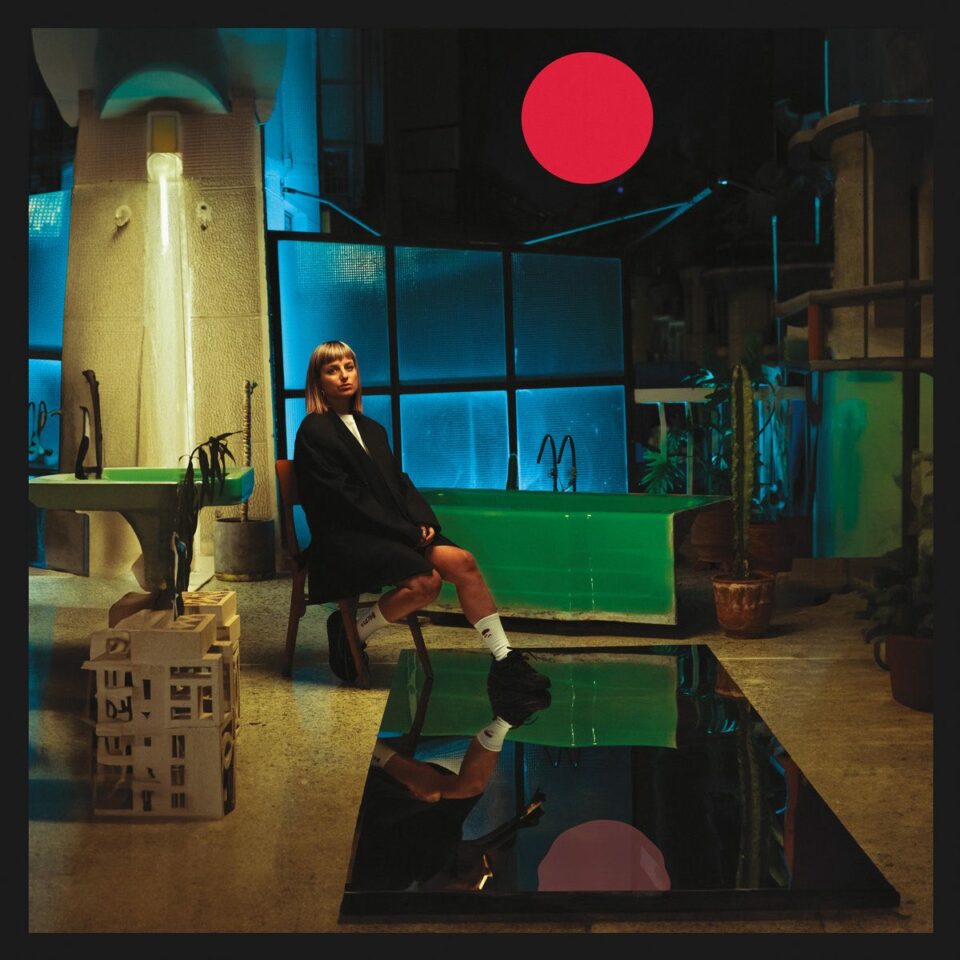Welcome to Rearview Mirror, a monthly movie column in which I re-view and then re-review a movie I have already seen under the new (and improved?) critical lens of 2022. I’m so happy you’re here.
When my children ask me what 2012 was like (a peculiar question, I know, but my as-yet-unconceived future children are sure to be a curious bunch), I will simply show them Pitch Perfect. The movie is a time capsule of its era, one that started as many trends as it borrowed—and with the upcoming TV spin-off due in a couple months, it’s worth remembering just how big this movie was, breaking a hundred million at the box office against a $17 million budget. Upon re-watching, I found that as a movie, it’s just OK. But as a cultural artifact? Yes. I’m gonna say it. It’s pitch perfect.
Let’s go back. In 2009, Glee premieres, and Anna Kendrick gets an Oscar nom for Up in the Air. At the end of the year, DJ Earworm uploads his second “United State of Pop” mash-up, and this is the one that goes super-viral. Two years later, Bridesmaids (which introduced Rebel Wilson to America) sets the stage for studios betting big on female-led ensemble comedies, so in 2012, when it comes time to release Pitch Perfect, it’s promoted not as a feel-good teen flick about the joys of college friendship but as a witty, gag-filled, slightly subversive and actually cool comedy starring the “approachable hot” girl and a guy from Workaholics. The message was clear: a cappella is for dorks, but Pitch Perfect isn’t.
The movie, scripted by Kay Cannon and loosely based on a non-fiction book about collegiate a cappella competitions, is in on the joke. A cappella is lame. It’s for losers. But within its ranks there are hot losers who make it seem fun and gross losers who suck. (Personally, I’m of the opinion that a cappella is just fine in college, and a huge red flag the moment you graduate. Same goes for short-form improv.) The movie doesn’t ask us to believe that a cappella rocks, necessarily, only that these groups are focused on rock as much as the form allows. Usually it works, but sometimes it tips its hand, like when Christopher Mintz-Plasse, leading auditions, more or less calls out Glee for being too much about feelings. We knock it now, but those kids on Glee were dealing with much higher-stakes stuff than anything that happens in Pitch Perfect, so I’m not sure the comparison serves the movie well.
Pitch Perfect is a time capsule of its era, one that started as many trends as it borrowed. Upon re-watching, I found that as a movie, it’s just OK. But as a cultural artifact? Yes. I’m gonna say it. It’s pitch perfect.
Because the plot of Pitch Perfect is pretty cookie-cutter. In a moment reminiscent of the Bridesmaids food poisoning scene, Barden University Bella Aubrey (Anna Camp) blows her team’s shot at glory by barfing onstage during ICCA national championships. Cut to a year later, the Bellas have to refill their ranks with a motley crew of whoever’s around, like Fat Amy (Rebel Wilson), nearly mute Lilly (Hana Mae Lee), and butch Cynthia (Ester Dean). Initially hesitant to join is Beca (Kendrick), because she’s too cool for school. Literally. Beca wants to move to LA to be a DJ, but her dad teaches at Barden so she has to go, at least for a year, even though she’s wearing eyeliner and bracelets and a scowl.
Beca does not like movies because they’re predictable. Beca likes making mash-ups on her computer and that is it. She’s pretty much the most annoying person you meet in college, except she’s Anna Kendrick, so in this case you don’t mind. Bella Chloe (Brittany Snow) eventually corners Beca in the shower and convinces her to audition, and here we get the moment that would take Pitch Perfect from hit to heavyweight: the cup song.
Oh, you don’t remember the cup song? The fucking cup song? It was Kendrick doing that hand-clap pattern we all did at summer camp and singing, and it was such a hit that everyone learned it and performed it and Kendrick released it as a single and two little girls set “Call Your Girlfriend” to it and they went viral and the Washington Post wrote about how kids wouldn’t stop doing it in the cafeteria.
It was the rare meme that came off-line—the “Let It Go” of its day. And it’s not the only moment from the movie that audiences ran with. “Fat Amy” was, for a time, hailed online as a body-positive hero for embracing her size and proudly “mermaid dancing” in front of “twig bitches.” On Tumblr, young queer girls shipped Chloe and Beca, hard (they have so much more chemistry than Beca and Jesse, it must be said). On TikTok, you can find millennials who still, try as they might, know the entire “riff-off.” And however ironic we were being, there was a two-year period when, among my friends, it was perfectly acceptable to ask one another, “Aca-scuse me?”
Once Beca’s a Bella, things unfold as expected. The girls battle the all-male Treblemakers and overcome vocal nodules and self-doubt to triumphantly perform mash-ups arranged by Beca, who has, by the way, learned that it’s OK to need other people and gotten the guy (Skylar Astin). Oh, and this was the debut of one Ben Platt who, no joke, entered college right when this movie premiered and joined my friend’s a cappella group and was…weird.
There are certain genres—like movies with big dance numbers, for instance—that are best viewed in a group. A cappella, especially, looks and sounds downright stupid when you watch a performance alone, but with an audience, it can be charming.
Anyway. Thanks to Wilson, Elizabeth Banks, John Michael Higgins, and Adam DeVine, the movie is genuinely funny. The songs, of course, date it (also, is it just me or are Beca’s mash-ups…bad?), and there’s a disappointing stereotyping of any Asian onscreen (Beca’s roommate Kimmy Jin is a huge bitch for no reason?), but the rest of the jokes have aged so strangely it’s kind of fascinating.
Culture moves quickly on college campuses; with a full turnover in undergrads every four years, it doesn’t take long for something fringe to become normalized. There are a number of references to various characters being lesbians, but I assume that on most big campuses in Pennsylvania, where Barden is set, the girls would just be out, if they even used labels. Jokes about “Deaf Jews” might not fly in some circles, but seen another way, it’s a win for representation. “Fat Amy” was funny at the time…a few years later, she’d be an example of internalized self-hatred…then she’d be bravely reclaiming the word…and now? It’s almost beside the point. There is still rampant fatphobia, but we also have Lizzo. On the flip side, Rebel Wilson isn’t even fat anymore. And speaking of singers, neither is Adele. Pitch Perfect is 10 years and a lifetime ago.
Thanks to its success, Pitch Perfect got two increasingly silly and increasingly starry sequels, and stayed beloved by fans mostly due to the cast’s off-screen antics. Much like the four women of the Sisterhood of the Traveling Pants, the Bellas are IRL friends. Elizabeth Banks directed the second installment, and there was even a Pitch Perfect marriage! (Skylar Astin and Anna Camp, now divorced). Now a spin-off about Adam DeVine’s character. Maybe it’ll be good. Maybe it’ll be great. But given Peacock’s track record, it’s unlikely to be a hit.
It’s telling that the show is straight-to-streaming (as was Girls5Eva, very much cut from Pitch Perfect’s cloth). Could you even put a Pitch Perfect on broadcast, or in theaters, in 2022? Eurovision (which I really liked!) hit Netflix without much fanfare. Popstar: Never Stop Never Stopping, released a year before the third Pitch Perfect, failed to catalyze the Lonely Island fanbase and flopped, despite being one of the best comedies of the century (really). It’s a shame, because while streaming might make movies more accessible, there are certain genres—like movies with big dance numbers, for instance—that are best viewed in a group. A cappella, especially, looks and sounds downright stupid when you watch a performance alone, but with an audience, it can be charming.
I can’t say I miss the cup song. But, and maybe this says more about me than the movie, shortly after finishing my re-watch for this article, I decided I might as well watch the sequel. FL









